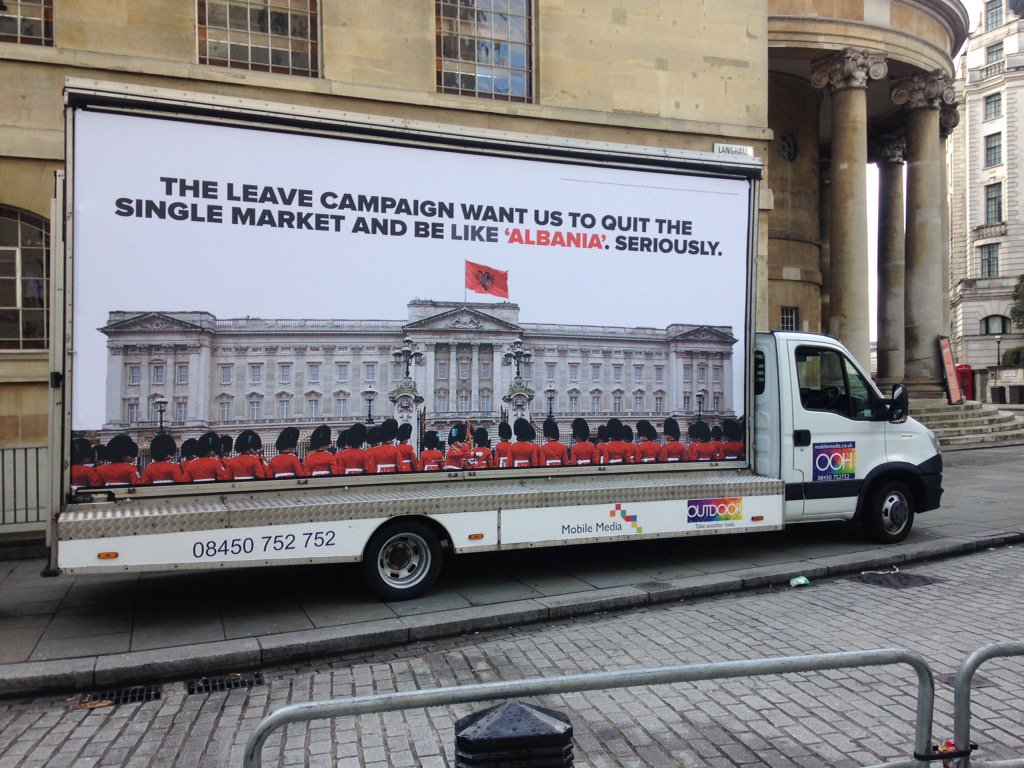Is it crazy to see Albania’s EU relationship as a model for post-Brexit Britain?
Michael Gove, UK Justice Minister and Brexit campaign leader, proclaimed that after a successful leave vote, the UK could trade with the EU/Single Market like the three impoverished countries of “Bosnia, Serbia and Albania.” These western Balkan countries are EU candidate states and have a constricting free trade agreement with the bloc covering certain goods and some financial services.
May 2, 2016 -
Epidamn Zeqo
-
Articles and Commentary

Brussels sees these bilateral pacts, known as “stabilisation and association agreements” (SAAs), as special support for post-communist transition economies at the start of a long journey towards EU membership, rather than a divorce settlement for an integrated and developed one. Yet the SAA is a sui-generis or unique relationship between the Single Market and the EU candidate states in the Western Balkans, therefore, it has created the precedent of being able to trade goods with the Single Market without membership.
Photo via Twitter (@StrongerInPress)
Only a seasoned Tory MP like Mr Gove was shrewd enough to seize on this valid precedent. It might go down well with the UK business community because it demonstrates that you do not need to pay the hefty EU membership fee to trade goods. It should be looked at more carefully as it does have elements of an “alternative model” for a Brexit vis-a-vis joining the European Economic Area with Switzerland and Norway who semi-automatically apply EU law, accepts free movement and pays into the EU budget.
Mr Gove’s remarks have drawn scorn with pundits and pro-EU opponents considering the apparent reference of the “Albanian model” as a “tactical blunder”, “crazy”, and “strange and absurd”.
Even Albania’s prime minister, Edi Rama, offered his op-ed to the Times, saying that “It’s absurd to drag Albania into the battle for Brexit”. In an attempt to “roll with the punches”, Rama went on to thank Gove for giving Albania a welcomed dose of publicity before the summer holidays and to invest (I guess being ridiculed is better than being ignored?).
Everyone knows it’s erroneous to compare any of the Western Balkan countries with the United Kingdom. Moreover, the SSA is a quasi-developmental trade deal so it won’t suit the needs of a cosmopolitan nation like the British. For example, Albanians, Bosnians and Serbs are not allowed to move freely and settle in the EU. Tony Barber’s sarcastic comparison of the Albanian post-communist exodus (1.25 million Albanians, almost a quarter of the population) to the two million Brits living and working in the EU was classless and unnecessary.
Evidently, these countries are just bad models in every aspect of governance, politics and the rule of law. But wasn’t Gove merely referring to the relationship that EU candidate states like Albania and Serbia have with the EU, and the precedent created by the SAAs? I was also surprised that critics have focused predominantly on Gove’s suggestion of following an “Albanian model”, pitilessly pointing out how absurd any comparison is. I’m puzzled why they did not call it the “Albanian precedent”? What about the “Bosnian model”?
Reading all the witty reactions I doubt if Britain and Albania are mutually exclusive? What do Brits really know about Albania and Albanians? British literary giants such as Shakespeare, Gladstone, Disraeli, Byron, Eduard Lear, and Edith Durham have all portrayed Albania. In the 19th Century, Byron and great painters such as Lear and Leon Jérôme, presented European chancelleries with noble views of proud and dignified Albanians.

Despite this, perceptions today towards the Western Balkans and Albania in particular are largely at odds with Byron’s romantic representation. Instead, Brits are uneasy with the idea of these countries joining the EU and view the culture at odds with their own, at least to a certain extent. Who can blame them, positive stories do not translate into popular culture as easily as the hit movie Taken. Albania is still considered an unworthy European state by most EU members.
It is true that the issue of the form of the state and its substance may not yet have an adequate policy and certainly not productive political culture in both Albania and Kosovo. However, this does not hinder the trend for progressive development in the future. It’s imperative that thepost-communist Albanian elite understands that aside from the political and economic dimensions of EU integration, the cultural integration is mission critical. This is because the dissolution of prejudice is the first step that leads to recognition.
Mr Gove, may I humbly suggest that it could be time to recognise that the best “Brexit model” could just be the “Bremain model” – in other words, the existing “UK model” with opt-outs in the EU. After all, being part of the EU/Single Market but not of the Schengen and the Eurozone looks like an excellent deal to most member states who are obliged to join all the pillars of our Union. Outgoing US President Barack Obama was perhaps correct to warn that it would be “a big mistake for Britain to leave the EU and set asunder what has been a very successful relationship”.
It makes sense that the President of a more successful union (USA) weighs in favor of unity of another incomplete Union (EU). I say the EU is incomplete because it still does not have a fiscal dimension, and it’s missing a key portion of the European jigsaw puzzle – the Western Balkans: Albania, Bosnia, Montenegro, Kosovo and Serbia.
Epidamn Zeqo holds an MSc in European Political Economy from the London School of Economics and a dual MA in International Relations and Modern History from the University of St. Andrews. A native of Albania, he lives and works in London.

































